Street cries of the world
Street cries were once a popular subject of songs and literature in Britain, continental Europe and elsewhere. Each month from 2018 onwards I'll be scanning and transcribing publications to build this collection.
+ British Isles pre-19th century
− USA, Jamaica and Australia
The Cries of New-York 1808
The Cries of Philadelphia 1810
The New-York Cries, in Rhyme c. 1825
The New-York Cries in Rhyme 1836
The Boston Cries, and the Story of the Little Match-boy 1844
City Cries: Or, a Peep at Scenes in Town 1850
The Street-Cries of New York 1870
Excerpts from the Jamaica Gleaner group of newspapers 1896–1990
Street Cries of an Old Southern City 1910
Street Cries of Philadelphia 1920
Hawkers & Walkers of Early America 1927
Kingston Street Cries and Something About Their Criers 1927
Part 1 Part 2
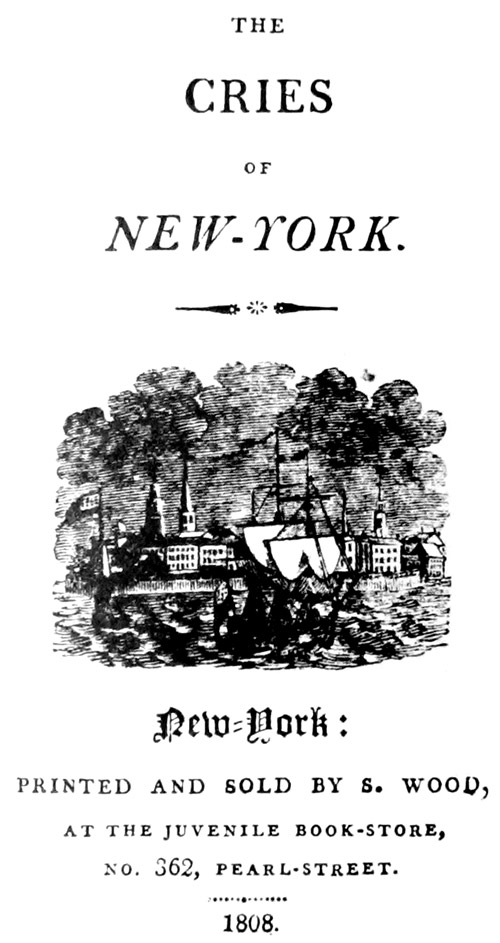
NEW-YORK
Is one of the largest cities in the United States of America, and the first in commerce. By a census of the inhabitants of the city and county of New-York, taken in 1807, the total number amounted to 83,530, and the number of houses, is supposed to be about 10,000.
It is situated at the southern extremity of Manhattan, or York-Island, and is separated from the Main Land, bu Haerlem Creek; from Long-Island, by the East River, or Sound; from Staten-Island, by the Bay, in which are Governor’s, Bedlow’s, and Oyster-Island; and from New-Jersey, by the North, or Hudson’s River. It was first settled by the Dutch, in 1615, and called New-Amsterdam; but, by conquest and agreement, was several times owned by the English and Dutch, alternately.
Nature has done much towards making this one of the most advantageous situations for extensive commerce in the universe: it being at the junction of two such fine rivers, with a safe and spacious harbour, so near the sea, in a temperate climate, healthy and pleasant, and backed by an extensive and fertile country.

IN order to preserve in safety and quiet, the city from thieves, robbers, and fire, while the inhabitants sleep, there are a number of men hired to watch and guard the place, who have certain stations, and walk to and fro. They go armed with a club; and, for a defence, wear a strong leather cap. There are a sufficient number to relieve each other, so as to stand two hours at a time, and then retire to the Watch-house to rest for two hours, and then they turn out again. This is an unpleasant, but necessary service; for, cold or wet, they must attend; and sometimes, in taking up resolute thieves, and in clearing disorderly houses, they are exposed to insult and danger. They ought to be well paid for their services, and to be very attentive and watchful, for much depends on this class of men.
For the greater convenience of walking, as well as for safety when there is no moon-shine, the streets are lighted with lamps on posts at small spaces distant.
The cut represents a watchman with his cap and club; a lamp-post on one hand; and on the other, a watch-box, a little house in which they stand a part of the time sheltered from the inclemencies of the weather.
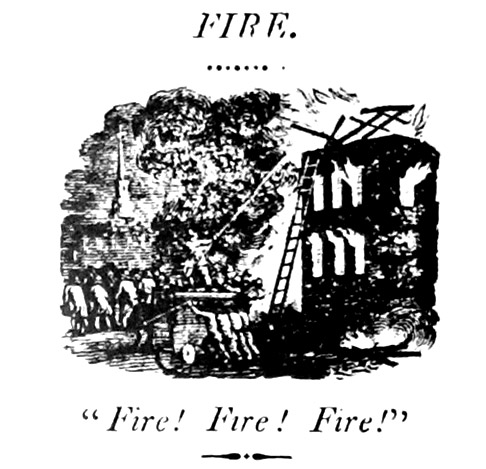
THIS is a dismal and alarming cry indeed in the night. It is generally echoed first by the watchmen, who catch it from the bell in the cupola of the Jail, which is rung immediately on the sight of fire, by the person stationed there, where one is always placed to have an eye over the city. The alarm soon spreads, and becomes general — the bells ringing, with the cry of fire! fire! fire! from every quarter; the rattling of the engines; the burning and falling houses; and great destruction of goods and sometimes lives. And yet the consternation, and loss of the unhappy sufferers, are not sufficient to prevent some abandoned wretches from stealing their scattered property.
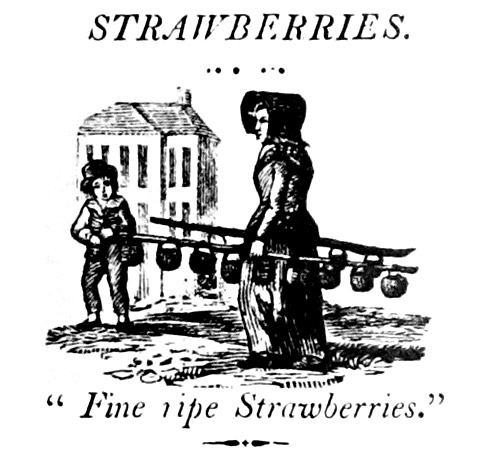
THIS delicious fruit, so pleasant in colour, smell, and taste is the earliest in the season that ripens. About the latter part of the spring, or beginning of summer, they are first brought to town. They grow wild in many parts of the country; but they abound about Tappan, Haverstraw, Kakaat, &c. places which lie on the west side of the Hudson, from twenty to forty miles from New-York. They are gathered in small baskets, holding from half a pint to a pint, and sell, when they first come, as high as thirty or forty cents for what is contained in a basket; afterwards, they get as low as six or nine cents. The baskets are covered with leaves from the walnut tree; and, strung on poles, as represented in the cut. Both men and women carry them up and down the streets, till all are sold and their baskets empty; when they return home for a fresh supply. There are a great many English strawberries raised in gardens near New-York, which grow much larger than the wild ones, and are sold in the different markets.

NEXT to strawberries, come the various kinds of cherries, which are carried round the streets from door to door by children. They are sold by the pound, at from fifty to three cents.
The children are quite blithe and merry,
When summer brings the crimson cherry.
This season kindly then imparts
Its maydukes and its sweet ox-hearts,
With common black, and red ones too,
And various kinds of lovely hue.
How anxious then each youth and maid
Survey the fruit, so well display’d;
And, while they are thus carried round,
They long to stop, and buy a pound.
While their kind friends their wishes meet,
And give the much desired treat.

THESE kinds of fruit, the produce of warm countries, are brought in great abundance to this city. The limes, lemons, and some of the oranges are very sour. The taste is grateful and useful to the sick. — They are much used to make a liquor, by the English called punch, but by the French contradiction; because it is made of articles, whose quality and taste are entirely opposite; as, spirits and water, sugar and the sour juice of the fruit. Punch is a palatable liquor, but very dangerous in its tendency, so that people, by its taste, are tempted to drink too much, which frequently deprives the wise of understanding; lays the strong prostrate; reduces man below the level of the beasts; qualifies for many evils; and is a great sin.
Oranges and lemons are commonly sold from 4 to 12 cents apiece; and limes from 9 to 12 cents per dozen.
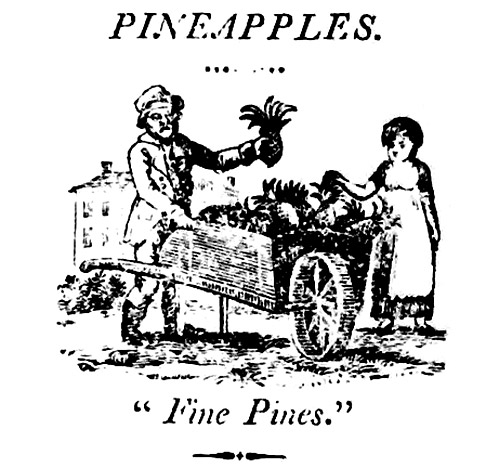
THE pineapple is very pleasant to the taste. Its smell very much resembles that of the strawberry. It is probable, that it took its name from a similarity in shape, &c. to a cone, or kind of wooden fruit, which grows on the pine tree, which has been denominated pineapple.
They are raised in warm countries, and are brought to this market from the West-Indies. There grows but one apple at a time, on a root: they are propagated by planting the crown, or tuft of leaves, which grows on the top of the apple, or from suckers that shoot out under the apple. The common price is from 12, to 25 cents.

THIS very palatable, cooling, and refreshing fruit is allowed to be good for the sick in fevers, as well as for people in health. Water melons are raised in great plenty, and with ease; but the difficulty lies in preserving them from thieves.
Strange, indeed, to tell; but so it is; there are many who would by no means take a cent from a neighbour’s drawer, and yet will steal watermelons. Equally astonishing is it, that a professed christian, whose principle tenet is, that we are bound to do, as we would be done by, especially an American, whose political creed is, “all men are born free and equal,” should so widely differ in practice, as to rob a fellow creature of the most valuable gem in nature, LIBERTY. But theft is theft.
“It is a sin to steal a pin:
Much more any greater thing.”
Watermelons are very different in size, and commonly sell for from 6 to 25 cents apiece.

THESE little girls are busy, in different times of the day, with a basket on their arms or heads, calling from door to door, to see who will buy; and it is not to be doubted, but that many, exclusive of the desire for radishes, are induced to purchase, in order to encourage the little ones in their laudable examples of application and industry. — We are formed for labour; and it is not only an injunction laid upon, but an honour to us, to be found eating our bread by the sweat of our brows, and not spend our time to no profit, as Dr. Franklin, in a facetious manner, describes, in relating the observations of a Negro.
“Boccarorra (meaning the white man) make de black man workeee, make de horse workee, make de ox workee, make ebery ting workee; only de hog. He de hog, no workee; he eat, he drink, he walk about, he go to sleep when he please, he libb like a gentleman.”
And now, I would ask my little friends, whether it is not more desirable and reputable, to be like the little girl in the picture, doing good, by being engaged in some useful employment, than like the gentleman-hog, only live to eat, drink, and sleep.
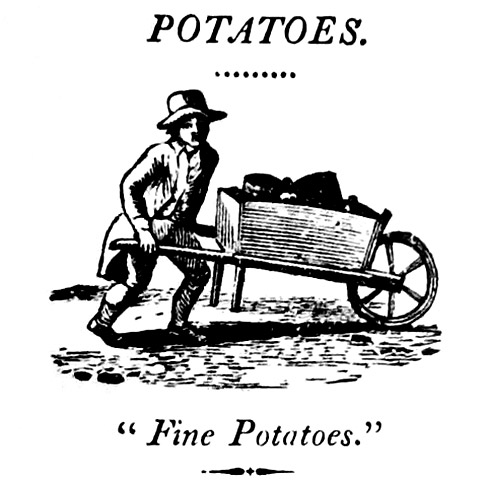
AMONG the useful members of society, this man claims a place in his humble station, perhaps with more honesty in his heart, and, if so, of course, with more honour on his head, than many who roll along in coaches, and glitter with gold; who spend their time in the pursuit of vain pleasures, instead of every day reflecting, how it shall be spent best to answer the design of him, who, in mercy, lengthens it out to us to be wisely improved, as preparatory to a happy eternity.
Count that day lost, whose low descending sun,
Views from thy hand no worthy action done.
The potato is a very valuable article of food for man and beast. It is easy raised; is cheap, wholesome, and palatable. They are produced in many parts of the world. The best come from Ireland and Nova Scotia.
Potatoes are raised in great abundance in the western part of the state of Connecticut; at Horse-Neck, Stamford, &c. about 30, or 40 miles from new-York, from whence they are brought by sloop-loads to market.
They commonly sell from twenty-five to fifty cents per bushel.
This valuable root is said to be native of America, and was first carried into Europe, by Sir Walter Raleigh, about the middle of the sixteenth century.

SWEET potatoes are raised by some in these parts of the country, but they are not so sweet, and it is difficult to preserve them through the winter for seed. They require a southern or warm clime, to bring them to perfection. They are chiefly brought from South-Carolina by water, several hundred miles. Their taste very much resembles that of a boiled chestnut. They are carted round the city, and sell from 75 to 150 cents the bushel. These, as well as other potatoes, turnips, &c. are measured by heaping the bushel. They are kept ready boiled by the huxter women, who sit in the streets, and in victualling houses.
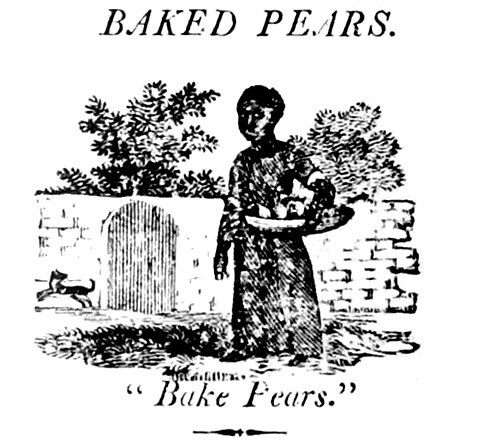
A LITTLE black girl, with pears in an earthern dish under one arm, cries “bake pears.” They sell one, sometimes two or three for a cent. This too is an honest way to procure a living. It is much to be lamented, that any person, white or black, should be willing to live by any means that are not honourable and honest.
In pears, as in some other kinds of fruit, there is a great variety in size and taste. Some are very pleasant to eat raw; others are only fit for cooking, or to make into cyder (or perry as it is called). The wood of the pear, as well as the apple tree, is of a solid and firm texture, and is frequently made use of to make buttons, and other articles, and when dry, is excellent fire-wood.

THIS cut represents a girl, with a dish of corn on her head, passing along the streets, crying, “hot corn,” “hot corn.” In the fall of the year, this cry is abundantly heard all over the city, from children whose business it is to gather cents, by distributing corn to those who are disposed to regale themselves with an ear. It is boiled in the husks while green, and, with the addition of a little salt, which the children carry with them, is very pleasant eating.
This very valuable grain, of which an abundance is raised and consumed as food by man, beast, and poultry, beside great quantities shipped to foreign markets, is called Indian corn, being first found among the natives of this country. The Europeans, to this day, have very little idea of using it as food; but Americans, by education and use, know its value.
Part 1 Part 2